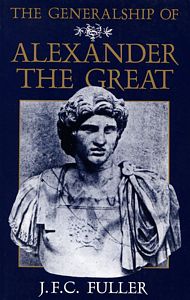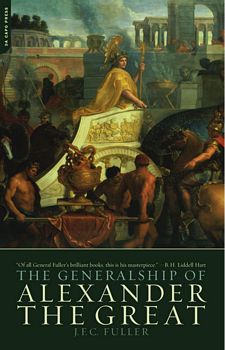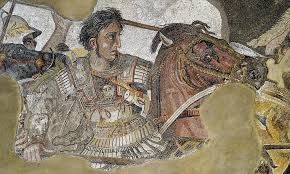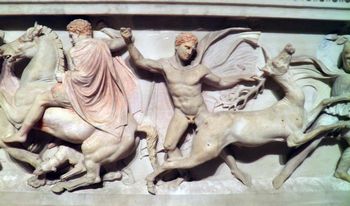generalship of Alexander the Great
| série: | Alexandre le Grand |
| éditeur: | Da Capo |
| auteur: | Fuller J.F.C. |
| classement: | biblio2A |
| année: | 1960 |
| format: | broché |
| état: | TBE |
| valeur: | 15 € |
| critère: | *** |
| remarques: | English book the generalship of Alexander the Great preface - this study is based on sir William Tarn's book, a great classical scholar of Alexander the Great - unlike Julius Caesar, nothing has been written within the 300 years of Alexander's lifetime; then we have the histories of: - Diodorus Siculus, 100 BC - Curtius Rufus, 150 AC - Arrian (a reliable historian), 200 AC which history is based on Ptolemy's Ephemerides (official journal) - Aristobulus, the geographer and one of Alexander's leading technicians this book is divided in two parts: - the Record (=condensed history of Alexander's career) - the Analysis (=study of Alexander's great battles FIRST PART A) the background 1/ decay of the city-states (polis) - prominent cities: Sparta and Argos (Peloponnese), Athens (Attic) and Thebes (Beotia) - comments on the citizenship, the civil discord (stasis) and the army (mercenaries) - various forms of government: aristocracy, oligarchy, democracy and tyranny 2/ reforms of the philosophers, extracts from: - Plato's Republic and Laws (= communistic tendencies) - Xenophon's Anabasis - Thucydides' Peloponnesian war 3/ Philip II of Macedon - influenced by Epaminondas, a tactician of genius and the first Greek general in history to grasp the importance of concentrating superiority of force against a selected point in the enemy's front, Epaminondas defeated the Spartan army by using this tactic - description of Philip's career and character (practical, long-sighted and unscrupulous using as well bribery as military force) 4/ Amphipolis and the First Sacred war first war: - war between the Phocians (supported by Athens and Sparta) and the Thebans (supported by the Thessalians), after the defeat of the Thessalians, Philip established his control over Thessaly second war: - war again between the Thebans and Phocians, defeated with the help of Philip who in turn received the city of Amphipolis and was honoured by the Amphictyonic Council 5/ Isocrates' Panhellenic programme - suggestion to conquer Persia by uniting the Greek cities into a "Hellas" state (orations of Isocrates = Panegyricus, speeches of Demosthenes = on the crown, the Olynthiac, the Philippic) 6/ Byzantium and the Second Sacred war - campaign of Philip in Thracia, decisive battle of Chaeronea against Thebes and Athens 7/ congress of Corinth - Philip called a new order on all the Greek states, creation of a hellenic league represented by a Synhedrion or Federal Council - all the Hellenes in Greece (except the Spartans) were united into a single Greek federation (league) of which Philip was the generalissimo (stratego) B) the Macedonian army 1/ Greek warfare before Philip - the first battles were engaged each other in hand-to-hand combat = display of personal valour, then came the group fronting (the infantry with the hoplite), the city-state army was born with its main component: the phalanx which was designed for one single purpose: to rupture the enemy's front - however mobile operations were prohibited, for that purpose the cavalry was engaged but the Athenian general Iphicrates invented the light-armed troops (the peltasts) which could replace, espc. in mountainous country, the use of the cavalry - then progress was also made in siegecraft with catapults, movable siege towers (wooden towers on wheels) and battering-rams - two great forerunners for the development of professional soldiers: Dionysius I of Syracuse and Jason of Pherae (370 BC) 2/ Philip's new model army it consisted of - mounted nobles (hetairoi or royal companions of cavalry) - royal hypaspists or foot guard = force of infantry; hereof the pezetairoi (foot companions) formed the phalanx with the famous sarissa - it was a professional army imbued with a national spirit, contrary to the mercenaries, however the Macedonian army was not a maritime power C/ Alexander 1/ youth and education - born 356 BC, his birth was wrapped up with legend, from his father, Herakles was due to be his ancestor and Achilles the same from his mother, - we have some physical portraits from Lysippus his sculptor, Apelles his painter and Pyrgoteles his engraver, Alexander was instructed in practically all sciences incl. philosophy, medicine, botany, geography, poetry, military, politics and sport 2/ genius and personality - Alexander had an innate sense of royalty, before conquering others, he could conquer himself, royal behaviour again towards Sisygambis, Darius and Porus - he was completely wrapped up in his destiny and devoted to his task but he showed also compassion, espc. for his soldiers - although he became great through fortune, he became also worthy of his fortune (Plutarch) 3/ his misdeeds - relatively few in comparison with the facts, however: a) unnecessary ruthlesness in waging war (with Thebes, Tyr, Gaza, the Sogdians and the Malli) but it was the methods of war at that time b) personal crimes (mostly due from the same root: Macedonian opposition to Alexander's Persian policy) - Parmenion (in some way a political necessity) - Cleitus (due to excessive drinking but he repented as a king) - Callisthenes - the burning of Persepolis (somehow unclear but probably for political reasons) D/ the theatre of war 1/ the geography in 400 BC - two continents: Europe and Asia (up to India, Punjab), this was about 2/3 the extent of the USA inhabited by about 50 mio people 2/ organization of the Persian empire - which was then the center of world history, Darius I was not a conqueror but an empire organizer and administrator, he assured the rights and privileges of the subdued people, the empire was divided into satrapies, additionnally to the provincial levies, there was a standing army consisting of 2000 cavalry, 2000 infantry and 10'000 called the "Immortals", military roads were built, the western road was known as the "royal road" from Sardes to Susa (90 days for 1500 miles but 7 days for the imperial couriers), however the Persian army was mostly based on quantity rather than quality E/ strategical narrative - when Philip died, Alexander's succession was not unchallenged but fortunately Antipater and Parmenion remained loyal to Alexander, also he was a genius, espc. when considering his startling rapidity to act and react 1/ securing the home base - by subdueing Thessaly, Thracia, Illyria and Thebes as well as appointing Antipater as regent of Macedonia 2/ establishing the overseas base - democratic governments were installed in the Ionian cities and Persian administration was to remain, but Alexander separated civil and military commands 3/ winning command of the sea - securing the Mediterranean sea with the conquest of the Phoenician cities, espc. Tyre 4/ securing the south-western frontier - occupation of Egypt as a security in the rear and as a food-providing province; foundation of Alexandria, the largest city among the 17 known Alexandrias founded by him 5/ winning political supremacy - command of the economically important cities of Babylon, Susa and Persepolis where the total gold and silver treasures seized, amounted to 180'000 talents = about £ 44 mio (1930) 6/ securing the north-eastern frontier - conquest of Bactria and Sogdiana 7/ search for the eastern frontier - conquest of the Punjab (Porus and Taxiles) = similarity with the British policy (divide and rule), the quest for the ocean, however Alexander did not succeed in establishing his eastern frontier and was stopped at the Hyphasis river (near the Kashmir/Indian border) 8/ linking the empire by sea - march through Gedrosia and Nearches' sea expedition (Indica) 9/ imperial unification - mass-marriage, suppression of the stasi (factional discord among Greek cities), deification of Alexander who had not been the only one so far (see Lysander the Lacedemonian as well as Dionysius, Dion and Philip of Macedonia by some of his subjects - the deification was the justification for the need of finding a legal basis in a constitutional state for an extra-constitutional authority) SECOND PART A) Alexander's great battles 1/ the Granicus - the Persian troops were on that occasion inferior in number to those of Alexander, it was a battle of epic heroes (commanders against commanders), however strategical offensive of Alexander by first starting with a faint attack, then by a diagonal assault against the Persian center 2/ Issus - conventional battle in the usual development, i.e. main attack by Alexander's right wing whereas the left stands and flank movement towards the Persian center (Darius) with the cavalry 3/ Arbela (Gaugamela) - this time Darius's army was well outnumbering the one of Alexander, espc. with cavalry, but, if there was plenty of mobility, there was little stability in Darius' army - tactical aim of battle by Alexander a) defensive order in approaching the Persian army b) offensive in oblique order to throw the Persian line out of gear and push forward with a strong right wing c) charge through one or other of the gaps into the enemy's front - the whole based on following maxim: the whole art of war consists in a well-reasoned and extremely circumspect defensive followed by rapid and audacious attack 4/ Hydaspes - one of the most brilliant operations in ancient warfare, the difficulty was in the danger of the elephants for the horses (which were disturbed by the elephants) - the turning force: Alexander - the hidding force: Craterus B/ Alexander's sieges 1/ Halicarnassus - after some heavy sieges, the city was stormed but the two citadels: Salmacis and the king's castle surrendered only 12 months later 2/ Tyre - a formidable fortified city on a small island with about 40'000 inhabitants, on that occasion, Alexander reconstituted his fleet 3/ Gaza - possibly the hardest siege and the most remarkable one by Alexander when considering the difficulty to build a counter-mound with a huge ramp C/ Alexander's small wars 1/ the Balkan and Illyrian campaigns - these campaigns were also masterfully executed and prevented the Celts to invade Macedonia and Greece for the next 50 years 2/ the Persepolis campaign (Persian Gates) - mountain campaign against Ariobarzanes 3/ war in Bactria and Sogdiana - tactics against the Scythians - subduction of the Sogdian rock and the rock of Chorienes 4/ the Swat campaign - campaign against the Assacenians - capture of the Aornus rock (= Pir-Sar) being one of the most famous mountain campaigns of Alexander 5/ the Mallian campaign D/ Alexander's statesmanship 1/ as captain-general - Alexander soon realized that generous behaviour (policy of conciliation) would achieve more than ruthlesness, also he did not underestimate the important strategical aim of security to protect his bases, furthermore his political sense induced him to get the affection of the civil population (to win the inner front) 2/ as lord of Asia and reconciler of mankind - according to Tarn, Alexander had no plan to conquer Carthage and the western Mediterranea (such as Rome and Sicily), he would rather have concentrated in consolidating and unifying his empire and the only plan of conquest at the time of his death were the Caspian and Arabian sea regions - Alexander and his doctrine (Alexander as the first Christ?) E/ Alexander's generalship 1/ as genius - both Alexander and Napoleon were real geniuses, two ways to lead an army: by fear or by love (soldiers' affection), but above all, it must be the spirit of genius which is unknown to himself and to the others (an original genius does not know its own powers), - genius is passion and not reason 2/ as strategist (art of the general = strategos) - strategy = operations in plan = science or art of projecting and directing military movements = plan of war - policy is the continuation of strategy, the policy of Alexander was not to destroy but to conquest - three principal objects in carryng on war: a) to conquer and destroy the enemy's armed forces b) to get possession of the material elements of agression and of the other sources of existence (such as money) of the hostile army c) to gain public opinion - the five principal strategical principles: a) employ all the forces which can be made available with the utmost energy b) concentrate force at the point where the decisive blows are to be struck, to run the risk even of being at a disadvantage at other points in order to make sure of the result at the decisive point; success at this point will compensate for all defeats at secondary points c) not to lose time (rapidity) d) causing surprise e) follow up the success with the utmost energy n.b. however not leave the battle field in pursueing fleeing enemies to the disadvantage of the main battle + two outstanding strategical factors: establishment of secure bases and protection of communication lines 3/ as tactician - it must be however considered that without the army inherited from his father, Alexander's conquests, despite his genius, would have been inconceivable tactics = operations in action - the four primary tactical elements: the aim or object, security, mobility and offensive power - three accentuating elements: economy of force, concentration of force and surprise - great importance was given to the cavalry as a psychological effect with the charge - the art in war is to give blows without receiving them - Alexander's tactical operations 1/ principle of maintenance of the aim (one must profit from one's success) - Alexander subordinated strategical aim to the political aim and the tactical aim to the strategical i.e. a) destroy the inner front (Thebes) b) secure the Mediterranean sea (Tyre, Egypt) c) occupy Babylon, Susa and Persepolis (treasure) - usually in battles, the phalanx was the chest, the left wing defensive and the right wing offensive except at the battle of Hydaspis because the cavalry could not fight against the elephants - penetration was Alexander's tactical means; when however determined to follow his aim, he could of course change the course of action according to the events 2/ principle of security (defensive action followed by rapid attack) - mobile wings (both defensive and/or offensive) - reserves - use of field artillery (catapults) 3/ principle of mobility (velocity is the great element between force and weight) - speed dominated all Alexander's military actions 4/ principle of the offensive (be the first to attack, the best defense being the attack) - the offensive knows what it wants whereas the defensive is in a state of uncertainty, Alexander always adapted his actions to novel circumstances, he never did copy his successes 5/ principle of economy and concentration of force i.e. send the attack forces, squadron after squadron or attacking without great losses (security-bound) 6/ principle of surprise (augmenting the chances in one's favour) - it is the most effective element in attaining superiority, in ancient times, it was mostly the responsability of the commanding general whereas in modern times, responsabilities are shared with the general staff 4/ as leader - Alexander was the thinking and fighting head of the army, he did the same as did his soldiers, he was an example both with his courage and his invincibility - Alexander loved his companions but always dominated them F/ Epilogue - similarities with Alexander's art of war in modern times, i.e. Hitler's strategy (subvert your enemy from within) and like Philip, he created a new army based on mobility, the beginning of Hitler's operations were masterfully done but afterwards the light died - Hitler's failure was to deny the importance of the various nationalities in Russia and make alliances with these nations; instead he intended to enslave them or exterminate them (he was a butcher instead of a liberator) - contrary to Chamberlain, Churchill did somehow the same (war against Germany instead of supporting the Anti-Nazis), Staline was somehow better in line with Alexander's policy (establishing communist puppet governments) >> a very good book, a must for the reader of Alexander's biography - besides, giving a good description of Ancient Greek and Ancient warfare, also being a good narrative about the political background at that time, it describes well the military operations of Alexander (both strategical and tactical) - the book is also a good guide line for military study with plenty of maps and sketches |
| couvertures: |     |
Copyright 2008 - 2026 G. Rudolf
